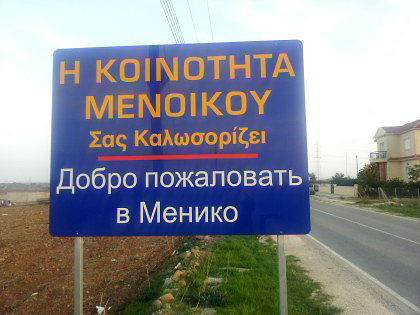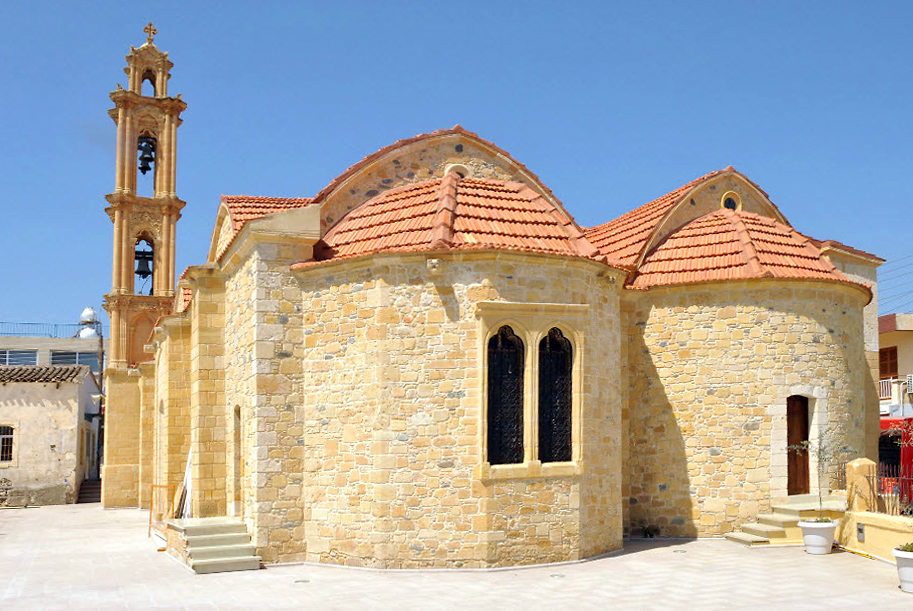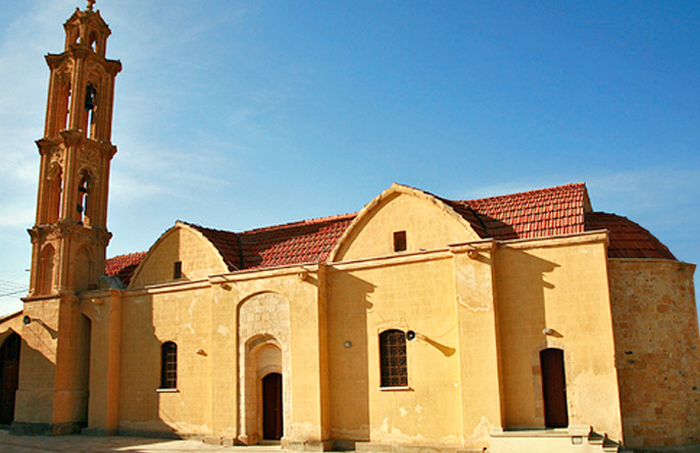The church of Cyprian and Justine is not typically one of the sights of Cyprus that first time visitors to island get to see, located as it is in the little village of Meniko, 20km to the west of the capital, Nicosia, away from the main tourist routes.
The village of Meniko

Utensils and a small clay pagan temple with idols dating back to the 6th century BC, were found during digs near the village.
There are several versions of how the village got its name.
One of them is that the name has been preserved since Byzantine times and is derived from the Greek word ‘eekos’ which means ‘a house’.
Another version says the name is rooted in a much older history and comes from the name Menikei which was the name of a son of King Creon, the ruler of Thebes, from old Greek mythology.
The church of Cyprian and Justine
But let’s go back to the destination of our visit, the church of Cyprian and Justine.
The church is not particularly tall and is insignificant from the point of view of architecture – the ancient belfry may be the only exception.
The interior of the church has changed in recent years.
All the walls of the church are now decorated with murals which were restored according to preserved drawings, whilst the gilded iconostasis of the 19th century, with artful carvings, is in just as good a condition as those in the most famous churches of Cyprus.
The main treasures of the church are, of course, the relics of Cyprian and Justine which were brought to Cyprus in the 13th century from Rome. Legend says that prayers offered to the relics protect people from harm caused by the servants of evil spirits – wizards, magicians etc.
Saints Cyprian and Justine
As we know from church historical sources, Cyprian lived at the end of the 3rd century in Antioch during the times of the Roman Empire, under the rule of Emperor Decius.
His parents had intended him to serve the pagan God, Apollo, since childhood, but Cyprian became a famous sorcerer instead. Christianity worked closely with paganism in those days, and many inhabitants of the Empire couldn’t understand the Christian faith and did not accept it.
A girl named Justine also lived in Antioch. Her parents were pagan, but thanks to talking with a deacon of the local church who regularly passed by, she learnt about Christianity, began to attend church and ultimately, along with her parents, embraced the Christian faith.
Once a young man named Aglaid from a rich, noble, pagan family proposed to her, but she rejected him saying that she served Jesus Christ whom she believed to be her Bridegroom. Aglaid didn’t want to give up and resorted to the help of the famous sorcerer and magician, Cyprian, to win Justine’s favour, but the young woman’s faith was stronger than the magic art and Cyprian felt his powerlessness and the strength of the real Christian faith and then believed in God, Jesus Christ.
When the persecutions of Christians began, Cyprian and Justine were arrested. They refused to renounce their faith and were beheaded. Their bones were buried in Rome.
According to legend, many people who came to their tombs and prayed were cured of their illnesses. Cyprian and Justine were beautified by the church. A prayer to them and kissing their relics are considered to be an aid for those suffering from sorcery and witchcraft.
In the church of Cyprian and Justine in the village of Meniko, you can ask the priest to read a prayer against witchcraft, whilst there is a saintly spring next to the church where you can take some holy water.
The church is open for visits from 9am – 12.30 and from 3pm – 5pm.
Nearby churches
Besides the church of Cyprian and Justine, there is a chapel of Saint George in the village.
Not far, to the east of the village, is a church of Saint Andronicus, and to the north a church of the icon of the Most Holy Mother of God known as ‘Mother of Children’ which is venerated by the local inhabitants.
A journey around the holy places of Cyprus has an inimitable charm. The grandeur of ancient churches and monasteries, the beauty of nature, the silence of the valleys, the freshness of the mountain air and, of course, the grace emanating from the numerous shrines hidden away from curious eyes in the far, lost corners of this ancient island, all merge together.

